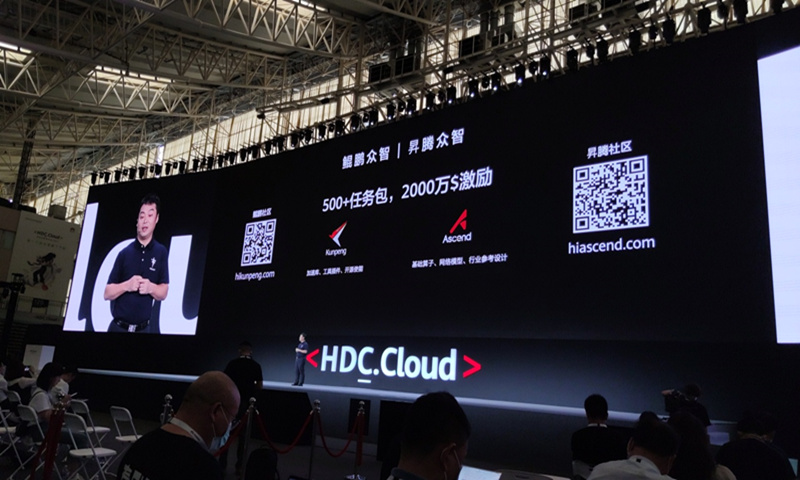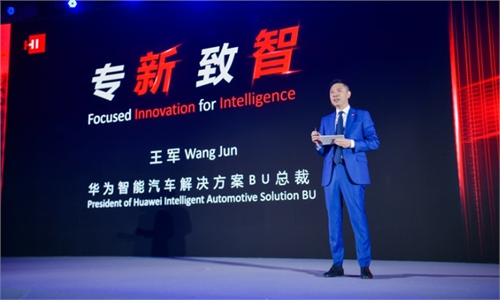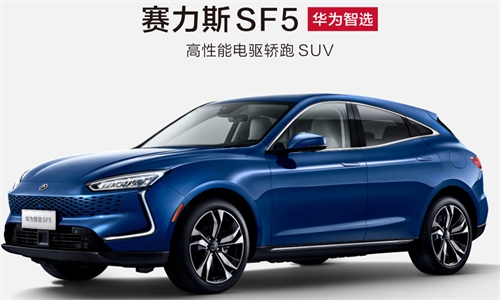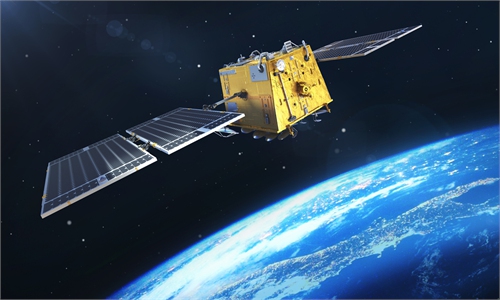
Huawei launches new products at the Huawei Developer Conference (HDC.Cloud) 2021 held in Shenzhen on April 25, 2021. Photo: VCG
Chinese telecommunications firm Huawei launched six "innovative and revolutionary" cloud products and services to further attract developers and build up its own ecosystem on Sunday, showing ambition in the cloud sector that's less dependent on chips, even though it's still lagging behind Alibaba and Amazon.
These six products - Huawei Cloud CCE Turbo cloud container cluster, CloudIDE intelligent programming assistant, GaussDB (for openGauss) database, Trusted Intelligent Computing Service (TICS), Pangu Model, and infrastructure software for diversified computing - will "deliver new levels of efficiency and quality to help developers push new frontiers," the company said.
The new products were launched at the Huawei Developer Conference (HDC.Cloud) 2021 held in Shenzhen. The three-day event is focused on the latest trends in cloud computing, artificial intelligence (AI), and open source.
At the event, Huawei also announced a $220 million investment into its Huawei Developer Program 2.0 this year, which will help it continuously foster an ecosystem around Huawei Cloud, Kunpeng and Ascend.
"By 2025, 100 percent of enterprises around the globe will be utilizing cloud technology. Cloud is the future of the ICT industry and the foundation for enterprises' digital transformation. Developers are the soul of the industry," Richard Yu Chengdong, executive director of Huawei and CEO of the cloud BU and consumer business group, said in a keynote speech at the event.
Huawei will continue to share its technological innovation capabilities and work with developers and partners to accelerate the cloud-based and intelligent transformation of businesses, Yu said.
The latest move in the cloud sector comes amid the firm's struggle under the impact of US sanctions, which have forced it to turn away from US-origin technologies and products such as chips, and put more emphasis on software and services.
"From selling cars to a broader push into the cloud business, the effort is a manifestation of Huawei's eagerness to offset the decline in its mobile phone business," Jiang Junmu, an industry analyst and a close follower of Huawei, told the Global Times on Sunday.
"It's been also laying out more businesses, from cloud and cars to smart home appliances, to see where it can best offset revenue losses from the hardware sectors," Jiang said.
Huawei's cloud business has been developing rapidly. According to research firm Canalys, Huawei's cloud revenue jumped 168 percent year-on-year in 2020.
However, it's facing stiff competition from domestic competitors such as Alibaba and Tencent and also global giants such as Amazon.
In the fourth quarter of 2020, Huawei Cloud became the second-largest player in China with a 17.4-percent market share. Alibaba was the biggest cloud services provider, with a market share of 40 percent. Tencent Cloud was third with a market share of 15 percent, according to Canalys.
"Compared with its industry counterparts, Huawei has advantages, such as synergy with our hardware products, and experience in dealing with government and enterprise consumers," Zhang Ping'an, president of consumer business cloud services, told the Global Times on Sunday.



